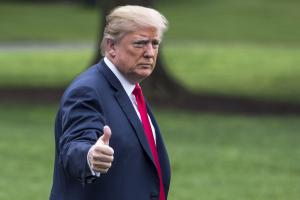May 8 (UPI) — President Donald Trump said Tuesday he is withdrawing the United States from the Iran nuclear deal, ending months of speculation on how he planned to handle what he described as “one of the worst deals in history.”
“I am announcing today that the United States will withdraw from the Iran nuclear deal,” he said in a televised address before signing a memorandum making the action official.
“The Iran deal is defective at its core. If we do nothing, we know exactly what will happen,” he added, warning of an arms race in the Middle East.
Trump said the United States would no longer abide by the terms of the Joint Comprehensive Plan of Action, four days before a May 12 deadline to decide whether to recertify the 2015 pact.
Trump has long weighed withdrawing from the JCPOA and has been a relentless critic of the Obama-era agreement. He’s described the agreement, which lifted sanctions on Iran in return for limits on its nuclear program, as “terrible” and said it contains “disastrous flaws.” The multilateral agreement was also approved by China, Russia, Germany, France, Britain and the European Union.
Under the deal, Iran agreed to eliminate its stockpile of medium-enriched uranium, cut its stockpile of low-enriched uranium and reduce its number of gas centrifuges.
In addition to taking issue with the expiration of some restrictions after 10 to 15 years, the Trump administration accuses Iran of being a bad actor regardless of any nuclear pursuits.
The administration wants an end to Iran’s “destabilizing influence” on the Middle East, its support of terror groups like Hezbollah and the Houthis in Yemen, and to limit its ballistic missile program. Iran also is accused of supporting the Assad regime’s atrocities against the Syrian people, hostility against Israel, threatening freedom of navigation in the Persian Gulf, cyberattacks against the United States and other countries, and arbitrary detention of U.S. citizens.
Iranian President Hassan Rouhani said the only other countries that disapprove of the deal are Israel and Saudi Arabia.
“We are determined to make sure [Iran] never possesses a nuclear weapon,” Secretary of State Mike Pompeo said in Saudi Arabia last week. “The Iran deal in its current form does not provide that assurance.”
Pompeo, who called Iran the “greatest sponsor of terrorism in the world,” said the United States would be prepared to “stand with Saudi Arabia” and was “deeply concerned about Iran’s dangerous escalation of threats toward Israel.”
“Iran has only behaved worse since the deal was approved,” Pompeo said.
Rouhani said Iran seeks “constructive” and “win-win” relations with the world, but will continue down the path of development at home regardless of any sanctions.
Despite encouragement from Israeli Prime Minister Benjamin Netanyahu, and Saudi Arabia’s King Salman and Crown Prince Mohammad bin Salman to nix the deal, many European powers, China and Russia have encouraged Trump to stick with the agreement.
A succession of European leaders, including French President Emmanuel Macron, German Chancellor Angela Merkel and British Foreign Secretary Boris Johnson, have visited the White House in recent weeks to persuade Trump to stick with the accord.
France said it will continue to push for a broader deal with Iran, “whether the United States participates or not,” French Defense Minister Florence Parly said Tuesday, noting the Iranians are “respecting” the agreement. Monday, Germany said it would remain in the deal.
“We don’t think there is any justifiable reason to pull out of this agreement and we continue to make the case for it to our American friends,” German Foreign Minister Heiko Maas said.
Russia has been an adamant supporter of the deal, and the Kremlin has said it “must be strictly observed by all signatories.”
China and India also are expected to resist any unilateral American action, as both nations are the world’s two top buyers of Iranian crude oil.
“With trade skirmishes between the U.S. and China and all kinds of political issues, I see the resistance from Chinese crude buyers to comply [to U.S. sanctions against Iran],” Victor Shum, vice president of the energy group at IHS Markit, told CNBC.

COMMENTS
Please let us know if you're having issues with commenting.